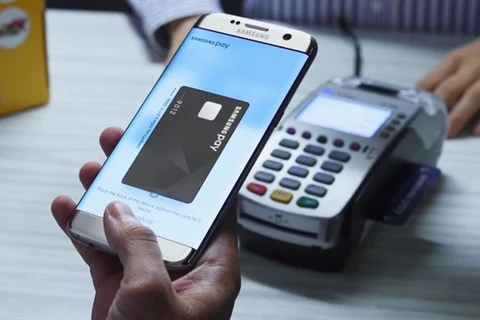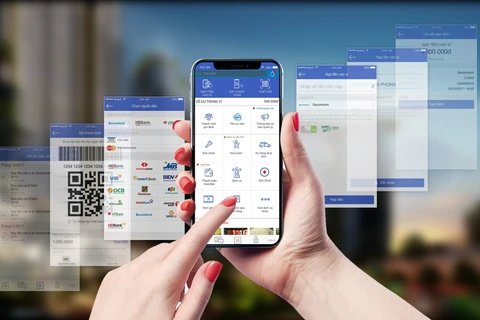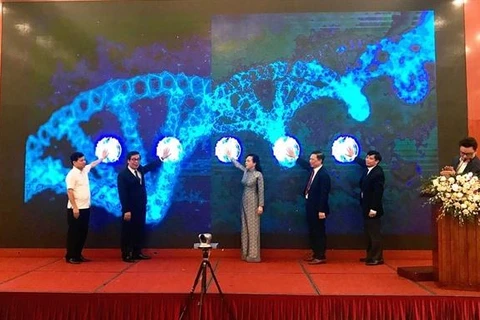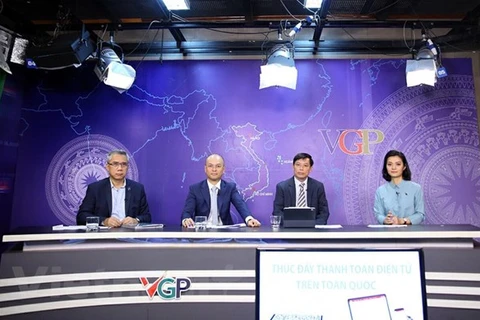Hanoi (VNA) - Cashless payment would not only increase the circulation of capital but also help boost the internet economy, said Deputy Prime Minister Vu Duc Dam.
Dam made the statement at the E-payment Eco-system Development Forum 2019 under the theme “Motivation by Chip Technology”, which was co-organised by the State Bank of Vietnam (SBV), the National Payment Corporation of Vietnam (NAPAS) and Thoi bao Kinh te Viet Nam (Vietnam Economic Times) in Hanoi on December 10.
Tapping opportunities brought by Fourth Industrial Revolution
Deputy PM Dam noted that the Politburo had adopted a resolution on the Fourth Industrial Revolution, while the Government had approved resolutions, strategies, directives and decisions on how to utilize the revolution.
Vietnam must take specific actions to fully tap opportunities brought by the revolution, he stressed.
The promotion of cashless payment will not only help mobilise capital from the people, but also contribute to preventing money laundering and corruption, as well as promoting the technological and knowledge economy, he said.
The Southeast Asian economy was dynamic with an internet economy of 100 billion USD that was expected to triple in the next five years, said Dam.
In order to promote the internet economy, a consensus was needed between State agencies, enterprises and banks, he said.
He added that infrastructure must be changed at a certain cost but it would be worthwhile for economic efficiency in the long run.
Technology has to be promoted to integrate information, including personal, health insurance and banking data, said Dam.
The Government has directed the sectors of tax, insurance, telecommunication and electricity to apply non-cash payments.
It has also decided to make education and health targets for non-cash payments earlier this year, the Deputy PM emphasised.
Addressing the event, Deputy Governor of the SBV Nguyen Kim Anh said that promoting electronic payment towards a cashless society is an inevitable development trend in the context of the Fourth Industrial Revolution, contributing to both pushing economic growth and supporting the implementation of a comprehensive financial strategy through the universalization of banking and financial services.
The central bank has planned to build, amend and supplement a legal corridor for banking and payment activities in particular to meet the requirements of new business models and products and services on IT platforms, with a focus on digital banking and payments, he noted.
Realising goal of chip technology application
According to data from the SBV, as of September 30, the value of transactions via the points of sale (POS) surged by 36.5 percent compared to the same period last year; the number of cards and automatic teller machines (ATMs) reached 96.4 million and over 19,000, respectively.
These are the basis for promoting mobile and internet banking. However, the switch to chip technology is facing challenges.
Nguyen Dinh Thang, Chairman of LienvietPostBank’s Board of Directors, said it is necessary to change technology systems to facilitate the application of the chip technology.
According to General Director of NAPAS Nguyen Quang Hung, the banking sector has made strong changes in this work.
Only seven banks issued chip cards at the beginning of the year, but now the number increased to more than 20, he said.
It is expected that there will be 26 banks and 10 companies supplying chip cards by the end of the first quarter of 2020, Hung noted.
He said the goal of 100 percent of banks applying the chip technology by the end of 2021 is entirely feasible.
At the event, memoranda of understanding to promote non-cash payment were signed between the SBV and the Ministry of Health; and between the Vietnam National Petroleum Group (Petrolimex) and NAPAS./.


























